Are Remote Employees More Productive?
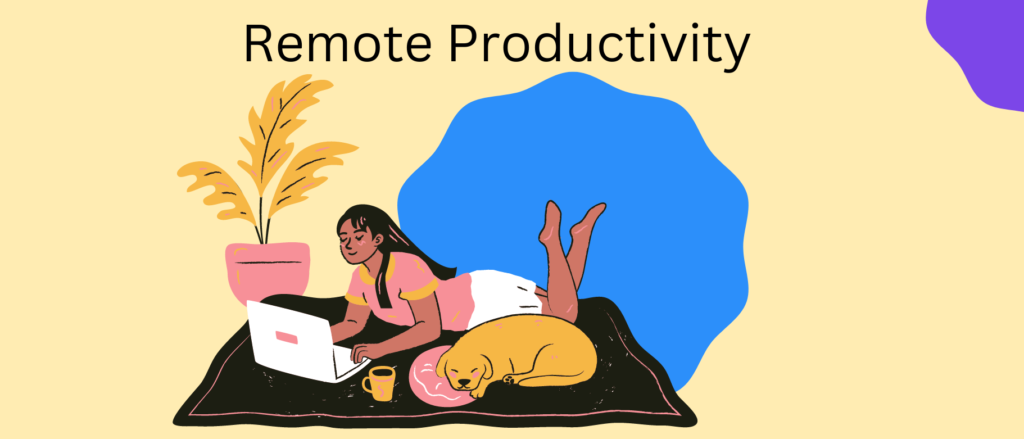
A lot has changed in how we work over the past few years. With advances in technology, more and more employees are working remotely. Some people believe that remote employees are less productive than those who work in an office setting. But is this really the case? Let’s examine some of the pros and cons of working from home.
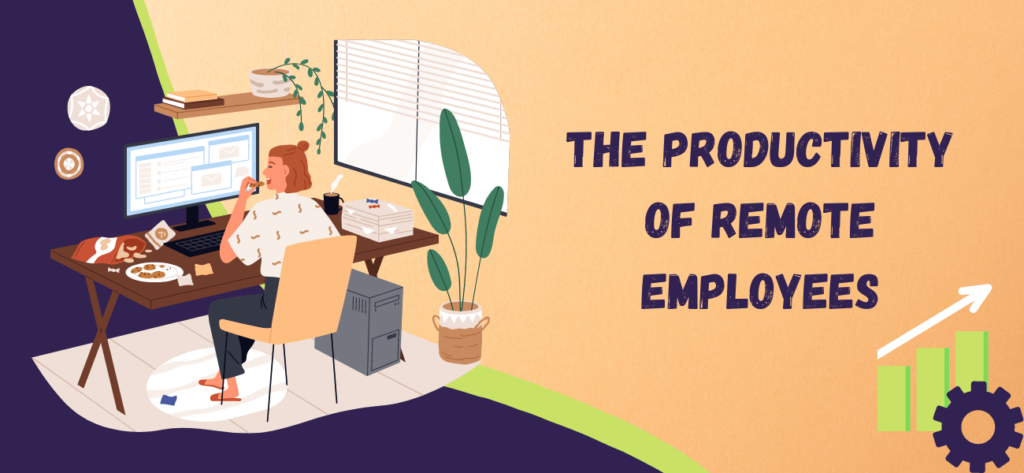
The Productivity of Remote Employees; A Burning Issue
When we study the research papers different findings come out. Some studies like the Fortune paper suggest that remote employees are more productive than non-remote workers. A recent study by the Harvard Business Review found that remote employees are more productive than their on-site workers/ office workers. The reason is that they are less likely to take time off and quit. A separate study highlights that employees who work remotely can save up to $4,500 annually on commuting costs.
Further to it, employees working remotely reported much higher job satisfaction than office workers. This job satisfaction leads to employee productivity of remote workers. Research shows that on average, workers who are satisfied with their jobs are 31% more productive.
Additionally, Adam Ozimek, Upwork’s Chief Economist says that the top three benefits that respondents felt they received from remote work were not having to commute, attending fewer meetings, and reduced distractions at the office – each of which was shared by 40% or more people; they do productive working.
In addition, the Washington Post stated that labor productivity increased by 1.8 percent from 2020 to 2021, which is higher than the average annual increase of 1.4 percent from 2005 to 2019.
A 2019 study conducted by Airtasker found that remote and in-office employees perform equally well. You may be surprised to hear that remote workers are actually more productive when they’re not in the office. In fact, 65% of them reported feeling more productive away from the office altogether.
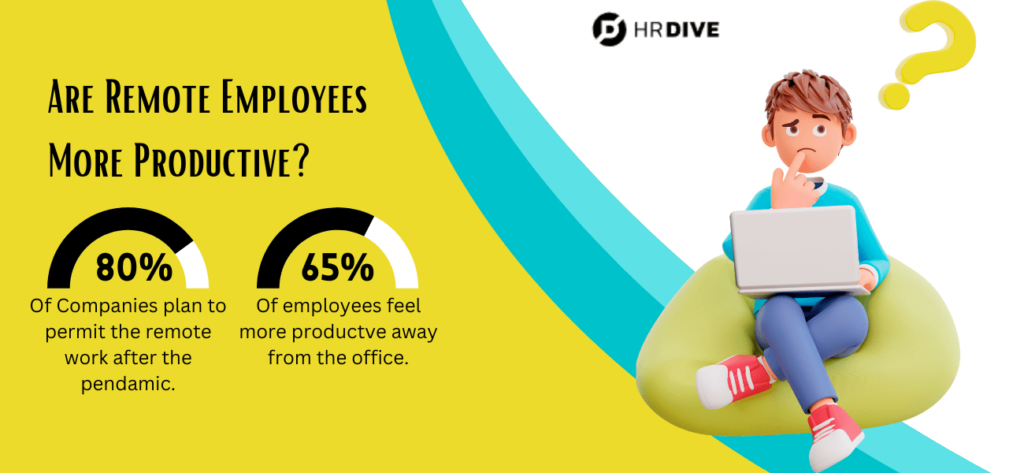
The above statistics and discussion show that remote workers are more productive than their in-office counterparts and enjoy higher job satisfaction. However, it is not that easy. There are many challenges for remote workers. If those challenges are not overcome timely, they might create serious productivity problems. Let’s discuss those challenges:
Challenges of Remote Work: Employee Productivity
As said earlier, working remotely has become more and more popular in recent years, as technology has made it easier to stay connected to an office setting no matter where you are. Employees working remotely with a remote team enjoy many advantages, such as increased productivity, flexibility, and freedom. However, some challenges come along with working from home that does not allow organisations to work from home. Let’s take a closer look at some of the pros and cons of working remotely.
1. Isolation During Remote Work
According to reviews, almost 30.9% of employees working remotely in the UK suffer from loneliness and isolation, which is a productivity challenge. When you work in an office, you are surrounded by other people and can easily socialise with co-workers during breaks or after work.
However, a remote worker may not have the same opportunities to socialize with others. This can lead to feelings of isolation and loneliness. A study found that slightly over 4% of people who work fully remotely feel lonely, while the same can be said for those who don’t work from home. The percentage is slower however we can say that isolation and loneliness can lead to lower employee productivity.
Moreover, remote workers agree that remote work improves productivity. Although over 59% of them also think that “working remotely regularly would weaken their professional networking, 55 % of workers said that their work relationships with their co-workers would be affected, and 54% showed concern that they will have to work when they work remotely.
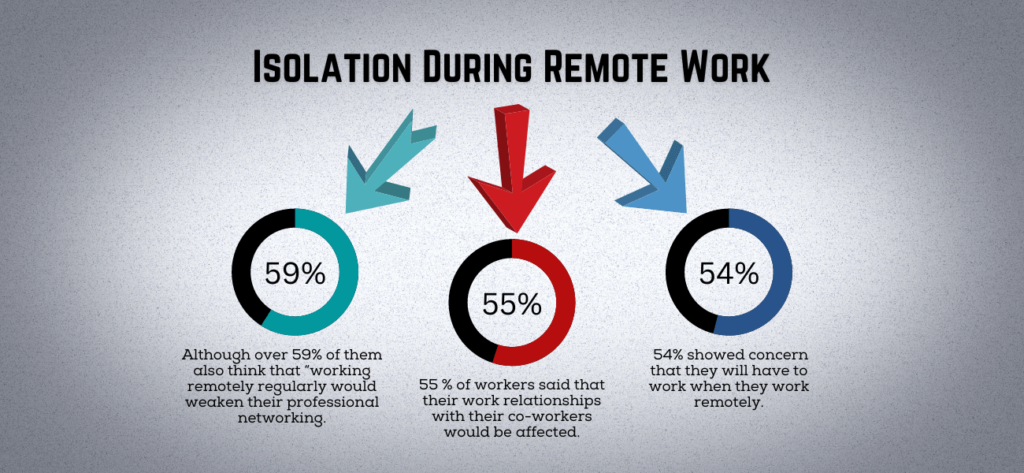
On the other hand, remote work eliminates commuting time, improves work-life balance, and enables remote workers to stay focused on their tasks without any interruptions. The saved commuting time can be used to stay productive at home.
2. Distractions at Home
One of the challenges of remote work is dealing with distractions at home. Although remote workers are not in a traditional office setting, they still need to be able to stay focused and productive. Some of the most common distractions that remote workers face include family members, pets, the television, and household chores. While these distractions can be difficult to avoid, remote workers need to try to minimize them as much as possible. Otherwise, they may find it difficult to stay on task and meet deadlines. In some cases, these distractions can even lead to lower-quality work. Therefore, remote workers must find ways to stay focused and avoid distractions while working from home. Otherwise, their productivity will suffer as a result.
Work-from-home life can be tough to adjust to, especially with all the distractions that come with it. A recent survey from Glassdoor shows that nearly 1,000 American employees are struggling with top concerns like TV and child care when working remotely. According to the report, roughly 32% of employees say watching TV is a top distraction when working remotely, followed by 27% who say child care is a huge distraction.
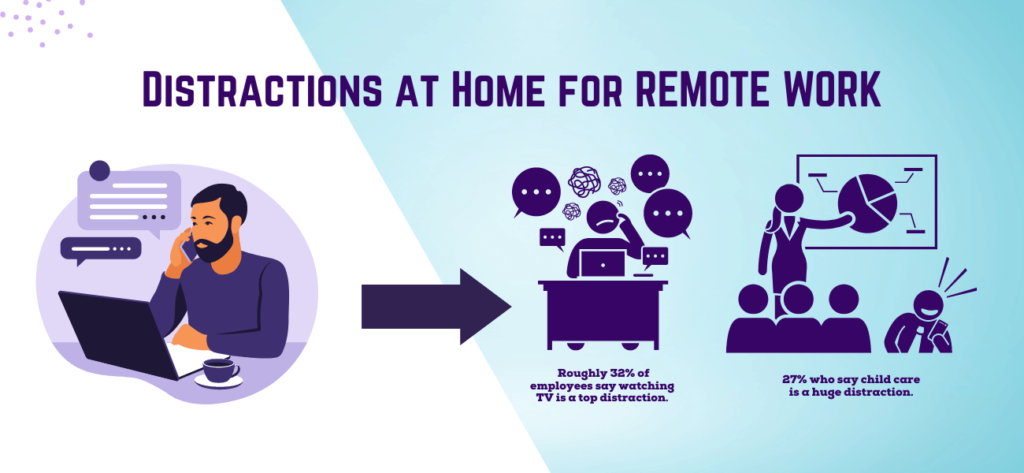
3. Time Management
One of the biggest challenges that remote workers face is a lack of time management skills. This not only affects their productivity but can also lead to burnout. Remote workers may not be able to manage work-life balance as well if they are unable to manage their work time effectively. There are a few reasons why this is the case.
- First, when you’re not in an office, it’s easy to let work spill into other parts of your life. This can mean working late into the evening or on weekends, which can quickly lead to fatigue.
- Additionally, it can be difficult to maintain a healthy work-life balance without set office hours. Without set boundaries, it’s easy to get caught up in work and forget to take breaks or spend time with family and friends.
- Finally, a lack of time management skills can also lead to procrastination. When you’re not sure when or how you should be working, it’s easy to put off important tasks until they become overwhelming.
As a result, a lack of time management skills is one of the biggest challenges that remote workers face. If left unchecked, it can quickly lead to burnout and decreased productivity.
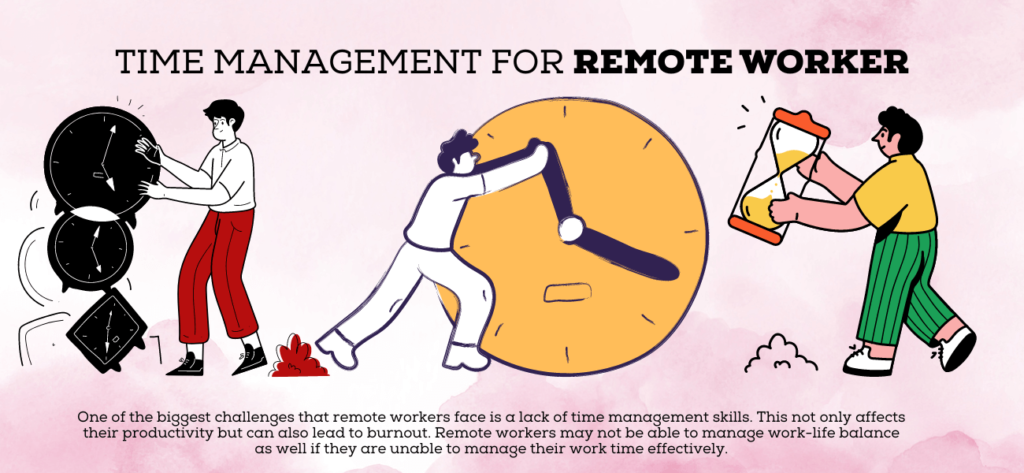
4. Lack of Structure
A lack of work structure can have a negative impact on remote workers’ productivity. In an office environment, there are typically set hours during which employees are expected to work. This provides a clear boundary between work time and personal time. However, when working from home, it can be more difficult to establish these boundaries. As a result, workers may find themselves working longer hours than they would in an office, leading to fatigue and burnout.
Additionally, a lack of work structure can lead to procrastination and a lack of focus. Workers may start their days with the best intentions, but end up getting distracted by household tasks or browsing the internet. It is important to establish clear expectations and set strict boundaries to ensure worker productivity while working from home.
Employees should designate a specific area in their homes as their “office” and make sure to stick to set work hours. Additionally, employers should provide regular check-ins and feedback to ensure that employees are staying on track. By taking these steps, employers can help to ensure that their workers stay productive while working from home.
According to Global Workplace Analytics, the number of people working remotely has increased by 159% since 2005. However, the challenges that come along with working from home, such as a lack of routine or chances for social interaction with coworkers, are often left out of these discussions.
Get more out of your business
Get the best employee engagement content every week via mailing list
5 Tips to Ensure Productivity While Working From Home
Despite the above distractions, remote employees are productive. The above and many other challenges can be overcome by following the tips below:
1. Establish a routine
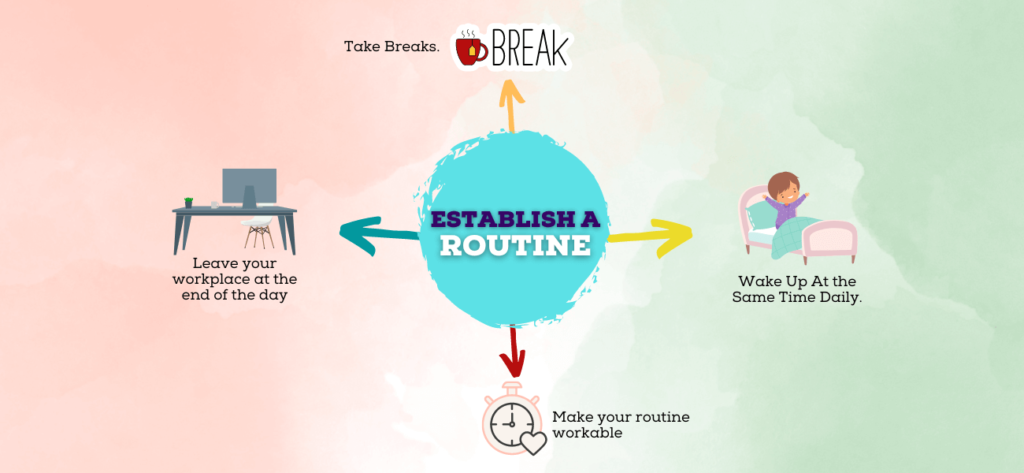
Establishing a routine is critical when working from home to maintain a healthy work/life balance. Below are some tips for establishing an effective work routine:
Wake Up At the Same Time Daily: Wake up at the same time each day and get dressed as if you are leaving the house for work. This will help to put you in the right mindset for the day.
Set up a dedicated workspace in your home: If you don’t have an extra room that can be turned into an office, create a space that is just for work, and make sure to keep it organised and free of distractions.
Take Breaks: Take breaks throughout the day, just as you would if you were working in an office. Get up and stretch, take a walk around the block, or grab a snack.
Make your routine workable: Schedule time for yourself outside of work. This might include taking a yoga class, going for a run, or reading a book.
Leave your workplace at the end of the day: At the end of the day, shut down your computer and leave your workspace. This will help to create a clear distinction between work time and personal time.
By following these tips, you can establish a routine that will help you to be productive while working from home and still have time for yourself outside of work.
2. Create a dedicated workspace
Another tip for staying productive while working from home is to create a dedicated workspace. This can be any space in your home that is free from distractions and where you can focus on your work. If possible, try to avoid working from bed or on the couch as this can make it harder to concentrate.

3. Set clear boundaries with family and friends
It’s also important to set clear boundaries with family and friends while working from home. Let them know when you are available and when you need to focus on your work. This will help to avoid interruptions and distractions during the day.

4. Take breaks
Make sure to take breaks throughout the day, even if it’s just for a few minutes. Step away from your computer, stretch your legs, and take some deep breaths. This will help to improve your focus and concentration when you return to work.
5. Avoid multitasking
Multitasking can be detrimental to productivity, regardless of whether someone is working in an office or from home. Although it may seem like a good way to get more done in a shorter amount of time, multitasking causes people to work more slowly and make more mistakes. When people try to do two things at once, their attention is divided and they are less likely to retain information. In addition, multitasking can lead to increased levels of stress and anxiety.
For remote working individuals, who may already be struggling with distractions and a lack of structure, avoiding multitasking is essential for maintaining productivity. By focusing on one task at a time, remote employees can avoid the negative consequences of multitasking and stay on track with their work. Research suggests that multitasking can reduce productivity by up to 40%.
You can do the following to avoid multitasking while working from home or the office:
1. Prioritize and plan your tasks: Before starting any task, take a few minutes to assess what needs to be done and prioritise them according to importance. Once you have identified the most important tasks, create a plan for how you will tackle them one at a time.
2. Set a timer: Give yourself an allotted amount of time to focus on a task and set a timer. This will help to ensure that you are focusing on one task at a time and avoiding multitasking.
3. Take breaks: Taking short breaks throughout the day can help with concentration and productivity. Use these breaks to clear your mind, stretch your body, or grab a snack.
4. Avoid distractions: Turn off all non-work related notifications and remove any distractions from your workspace. This will help you to stay focused on the task at hand.
5. Stay motivated: Remind yourself why you are doing the work that you’re doing, and use this motivation as a way to stay focused and avoid multitasking.
By following these tips, you will be well on your way to avoiding multitasking and staying productive while working from home. With a little bit of planning and focus, remote employees can stay motivated and productive while maintaining a healthy work-life balance.
So, Are Remote Workers More Productive?
As we read from the above article through the labor statistics of employees’ productivity during remote work. We discussed many advantages to remote working, and it is often thought that remote employees are more productive than on-site workers. However, many challenges can prevent remote employees from being productive. One of the main challenges is loneliness; without regular contact with colleagues, some workers can feel isolated and lonely, which can lead to low morale and decreased productivity. Other challenges include distractions at home, such as family members or pets, and difficulty staying motivated without the structure of a traditional office environment.
Despite these challenges, several factors can make remote working more productive. For example, workers have more flexibility and freedom when it comes to their work schedule, which can help them to manage their time better. In addition, they are often able to create a work environment that is tailored to their needs, which can help boost productivity. Overall, whether or not remote employees are more productive than on-site employees is contingent on a variety of factors. Ultimately, it is up to each remote worker to decide what arrangement will allow them to be the most productive.
By avoiding multitasking and taking regular breaks, remote workers can stay focused and productive while maintaining a healthy work-life balance. Through careful planning and self-discipline, remote workers can make the most of their working-from-home experience.


